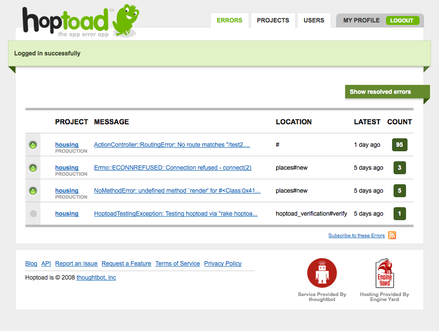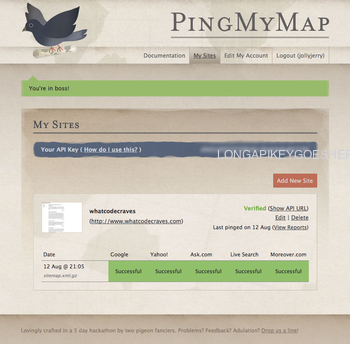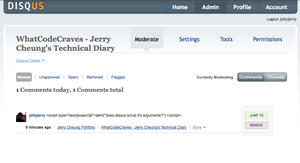I'm warming up to the idea of using small webapps that do less. Instead of full blown behemoth applications that take a lot of time to learn and configure, they're more in the spirit of Unix tools or perl one-liners. Here's three that I came across that show quite a bit of promise.

Think of Hoptoad as a beautiful and functional wrapper around exception notifier. Only rather than installing exception notifier per application, Hoptoad is a single stop for all your broken app needs. Setup is as simple as installing the Hoptoad plugin, adding 4 lines to your app, and running a rake task. After this, you can access your exceptions in Hoptoad's simple web interface, or subscribe to the provided RSS feeds. Each exception gets a summary view, some environment context, and a full backtrace. If you wanted to munge on that exception data some more, they include an API to access the site.

I came across PingMyMap when I was cleaning up my sitemap generator. At the time I only used Google's python sitemap generator. I'm not hell-bent on SEO, but I figured it wouldn't hurt for people to be able to find my site if it actually helps them. PingMyMap doesn't offer any tips or tools for optimizing your site. For an app that deals with sitemaps, it doesn't even offer you a tool to generate a sitemap! Instead all this mini app does is take an existing sitemap and send it off to 5 search engines that it knows about. It provides an API for you to post the actual sitemap, and then it'll tell you whether it was successful or not in submitting your sitemap to those search engines.

To play with Disqus, simply post a comment to this blog article :). Like the other two examples above, Disqus offloads the common tasks of 'comments' into a shared webapp. You can manage comments you get from multiples sites. It also offers integration with existing popular blog engines. Unlike the others, Disqus also holds some of your data. This eases management of that data, but at the cost of losing control of your own data. One of the main reasons I enjoyed using Blogger was that it allowed me the option to store my own data on my own server. One of the main reasons why I disliked Blogger was that functionality wasn't always guaranteed. Disqus shows promise because they also plan on having APIs for accessing their app, but only time can show if this one's a keeper.
For the record, I had the exact same idea for a webapp like Disqus for a long time. I even spent an evening a few days ago prototyping out a super raw version. My raw version let you do all kinds of crazy stuff... including XSS attacks, off-site AJAX calls, and SQL injection attacks :)
Even though these 3 apps do very different things, they all share a very similar feel. They don't try to do everything, they're simple to setup, and best of all, they're extendable and hackable through their APIs. It might not be the kind of extensibility that a full-blown open source project provides, but with the shallow learning curve, it's the right amount of extensibility to get stuff done.